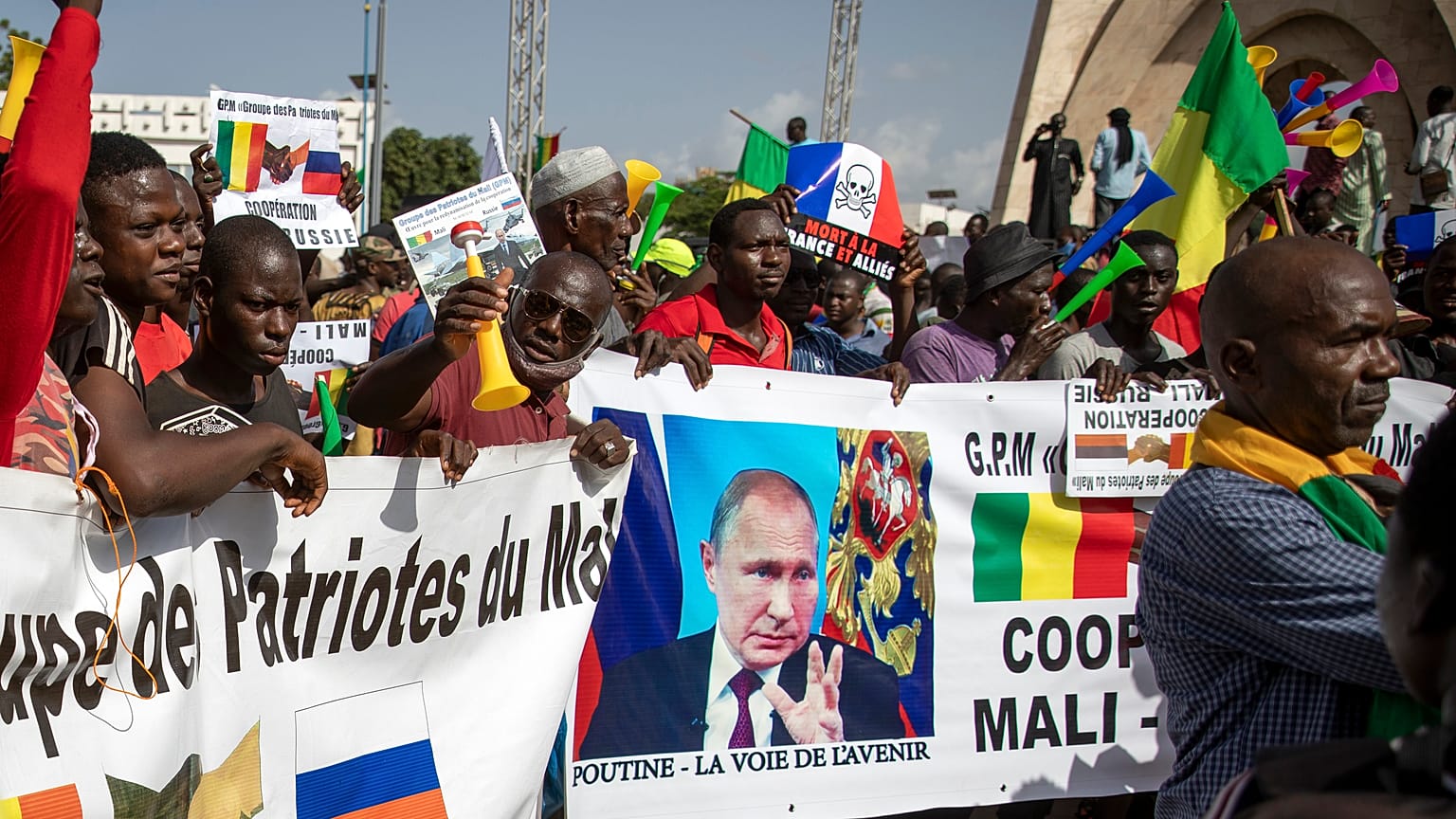Slammed by some as "hypocrisy," the sharp differences in Paris' policies towards Chad and Mali are actually explained by the need to counter Russia’s creeping influence in the Sahel, writes foreign policy analyst Nicolas Tenzer.
Paris is resuming military cooperation with Mali a month after joint operations were suspended in the wake of the coup d’état carried out by Colonel Assimi Goïta, reputedly close to Moscow. But despite this limited resumption of military cooperation, Goïta’s second putsch in only nine months has yielded a lasting legacy: it seems to have been the final nail in the coffin of Operation Barkhane, the sweeping counterterrorism operation initiated by Paris in 2014. While France intends to keep the elite international Takuba task force on the ground in the Sahel, the gradual return of Barkhane’s 5,100 French soldiers, mainly posted in Mali, is the end of an era.
 ADVERTISEMENT
ADVERTISEMENT
 ADVERTISEMENT
ADVERTISEMENT
Macron’s decision last month to end Barkhane drew some criticism from observers decrying Paris’ supposedly hypocritical Sahel policy. On one hand, Paris has strongly condemned the junta in Mali. On the other, meanwhile, the Elysée has no qualms supporting the military takeover in Chad that brought Mahamat Idriss Déby to the head of a transitional government after the shocking death of his father, former President Idriss Déby—just this week Macron welcomed Mahamat Déby to France for a “friendship and working visit.”
A closer look not only reveals the sharp differences between Chad and Mali but that what smacks some as “hypocrisy” is actually explained by the need to counter Russia’s creeping influence in the Sahel.
Mali: A classic putsch with Russian fingerprints
Goïta’s second bid to usurp power was a textbook example of a coup: the would-be strongman detained and deposed both the president and prime minister of Mali after he disagreed with their decision to sack defence minister Sadio Camara. One doesn’t need to look far to find a red thread leading to Russia—Camara spent a year living in Moscow, where he studied at the Higher Military College, and movements aligned with the Transitional Council are calling for a break with France and a clearer alignment with the Russian regime. If a smooth propaganda campaign is attempting to make it seem like the Malian population supports the coup and Russia, the reality is quite different.
Indeed, the Mali crisis is shaping up to be the latest illustration of Russia’s work in the shadows to pull countries into its sphere of influence, one of the greatest threats that Africa is currently facing. While China’s game plan in Africa is centred around the plundering of African resources, Moscow is also focused on countering Western influence on the continent.
Russia's massive arms deliveries to some African countries have been ongoing for two decades. Russian mercenaries already have a widespread presence in the Central African Republic (CAR), to the point that President Macron labelled the Central African President a “hostage” of the Wagner Group. These mercenaries, reportedly responsible for widespread human rights abuses, were likely involved in the recent attack on a border post on Chad’s border with the CAR which was condemned by Paris.
In Mali’s case, Moscow’s probable involvement in Goïta’s coup likely precludes any hope of fair elections. Russia will be happy to take advantage of the situation in Mali, and Moscow’s track record in countries such as Syria and Belarus has made it clear that the Kremlin is not likely to push for democracy abroad.
Colonel Goïta, meanwhile, will be even more reluctant to give up power given that the Malian constitution deems military coups crimes without a statute of limitation.
Chad: Transition in the face of extremist violence
In Chad, on the other hand, there’s hope that the transitional government, spurred on by Paris, will follow the roadmap laid out to organise free democratic elections. In sharp contrast to how Goïta came to power, Chad’s transitional government sought to diffuse an emergency situation. The crisis was quite acute: longtime Chadian leader Idriss Déby had likely been killed by FACT rebel forces trained by Russian mercenaries from the Wagner Group. The state itself was in peril, with rebels marching on the capital—something that could have had devastating effects given that Chad’s army is undoubtedly the most competent force in the region and the most committed to the fight against terrorism in the Sahel.
Along with Russian influence, the extremely complex threat of terrorism is probably the biggest challenge that Africa faces. Paris considers Chad a key ally in fighting against extremism in the region—Chad’s army is not only central to the G5 Sahel, but also plays a role in fighting Boko Haram in Niger and northern Nigeria. Under the circumstances, a power vacuum in Chad—as researcher Roland Marchal points out—would have been the worst-case scenario, and Paris’s support of Mahamat Idriss Déby was the only logical choice.
France has rightfully insisted, however, that Chad’s transitional government must implement “an inclusive transition process open to all Chadian political forces”, one which leads as swiftly as possible to a restoration of the country’s constitution and democratic elections. The transitional government has pledged to deliver such an “inclusive political dialogue”, and holding it to that pledge should be part and parcel of Paris’s support for Mahamat Idriss Déby’s government. Indeed, carrying out such an inclusive process that fully complies with human rights principles will be essential to ensuring Chad’s stability in the medium term and making sure that none of its citizens are left behind.
A delicate balancing act for Paris
The two recent case studies of Chad and Mali attest to the dilemmas and incredible difficulties which complicate France and its allies’ efforts to craft a clear policy addressing Africa’s challenges. They must fight against destabilising forces, whether Islamist or sent by Moscow. There could even be an objective alliance between them, as Syria’s example illustrated. France and its allies must also push all of the region’s countries towards more democratic models of government—both in order to limit the influence of a Kremlin which knows full well how to take advantage of internal unrest and dissatisfaction and to better combat jihadist groups which are adept at recruiting people disillusioned by repressive regimes. Rather than representing a policy paradox, France’s support (as well as the EU and the US’s) for Mahamat Idriss Déby’s government illustrates the fact that interim solutions are often necessary in order to pursue these complex objectives.
The restoration of Franco-Malian cooperation should not, therefore, be read as an endorsement of Goïta’s regime—but rather a pragmatic response to a sharply deteriorating security situation and fears that complete disengagement would push Bamako further into Moscow’s arms.
Nicolas Tenzer is a French foreign policy analyst and writer, author of three official reports to the French government and guest professor at Sciences-Po Paris.














